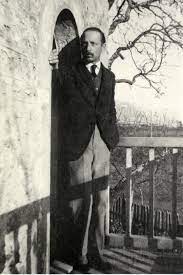Lovely and lyrical and as sharp as a
Center of all centers, core of cores,
almond self-enclosed and growing sweet –
all this universe, to the furthest stars
and beyond them, is your flesh, your fruit.
Now you feel how nothing clings to you;
your vast shell reaches into endless space,
and there the rich, thick fluids rise and flow.
Illuminated in your infinite peace,
A billion stars go spinning through the night,
blazing high above your head.
But in you the presence that
will be, when all the stars are dead.
Rilke
Rene Karl Wilhelm Johann Josef Maria Rilke died on this day, the 29th of December, in 1926 from Leukemia.
He wrote an epitaph for himself:
Rose, o pure contradiction, desire
to be none’s sleep beneath so many
lids.
He is best known as Rainer Maria Rilke. For many of us his poetry opened that rose of contradiction, of desire, and sleep, and dreams.
Rilke was born in Prague what was then the capital of Bohemia, on the 4th of December, in 1875. His family life was complex, his mother, mourning the death of a daughter, raised him as a girl. And then later she and his father insisted he go to a military academy. Then to a trade school. Failing at all these, he was allowed to go to university, where he studied philosophy, art history, and literature. He left university after a year.
Through a lover he was introduced to psychoanalysis, which complemented his interests in mysticism. Deeply interested in modernism, he worked for a time as Auguste Rodin’s secretary.
Rilke was drafted into the Germany army at the beginning of the First World War, but through the influence of friends he first worked in the War Records office, and then was discharged. After the war he moved to Switzerland. His health was fragile. And he spent most of his time between Switzerland and Paris.
During his life he wrote poetry, essays, letters, and a single novel.
One of Rilke’s poems, the Ninth Duino Elegy is chanted in some Zen centers, folded in together with more “traditional” Zen texts.
Part of some mysterious thing that is birthing into the world…
Here’s how it begins in Joanna Macy and Anita Barrows translation.
Why, if it’s possible to come into existence
as laurel, say, a little darker green
than other trees, with ripples edging each
leaf (like a wind, smiling): why then
do we have to be human, and keep running from the fate
we are made for and long for?
Or, perhaps you’d like to hear Stephen Mitchell’s version?













